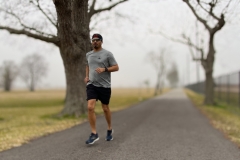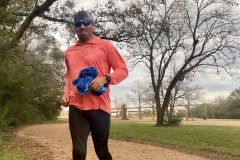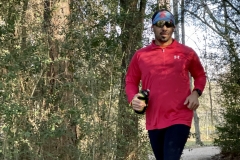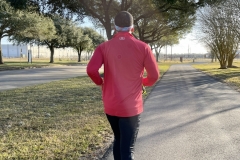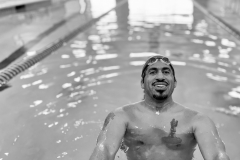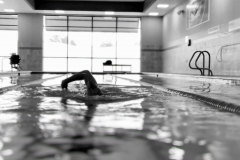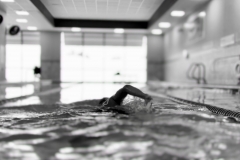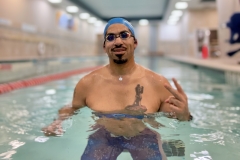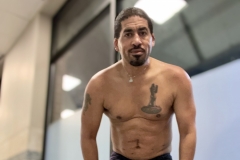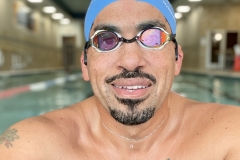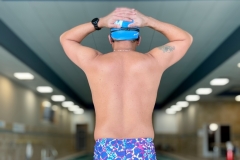I have come to the realization that deferring both Ironman 70.3 Texas and Ironman Texas 140.6 is the best choice for my long-term recovery. From the day I began walking with my catheter bag until the end of last week, I’ve had my eye on preparing for both of those Ironman races in April. I felt certain that I could recover well enough to make it through the full distance race. I didn’t have any illusions about setting any personal records, I simply wanted the experience and lessons of doing the events.
During the intervening time, I’ve consistently worked to balance activities that pushed my physical limits while avoiding those that would negatively impact my surgical recovery. A botched recovery is the last thing that I want to experience. I want a healthy and strong body…for many years to come.
As can be seen in recent training runs and swim sessions, I’m feeling good and my body is responding to the physical stresses exceptionally well. I even smashed the recent run assessment resulting in improved paces and predicted race times. These gains have given me confidence that I’m on a good recovery track and should expect to continue progressing and increasing the training volume leading into Ironman Texas.Adaptation challenges
I’ve also been struggling with the impacts of partial urinary incontinence. I have regained quite a bit of control. So much so that I don’t need to wear an adult diaper or underwear liners during the day. I urinate frequently but rarely leak or lose control and pee on myself. Doing long runs at a local park that has plenty of Port-o-John’s has been wonderful. I’m able to have a trail instead of concrete and I eliminate the stress of wondering how long I’ll have to try and hold my bladder. When I swim, I just get out of the pool and go into the locker room when I have to pee. No issues there either.
The primary issue occurs after I go to bed. I am unable to sleep through the night. In fact, I get up every two hours or so to use the bathroom. The frequent disruptions in my sleep have a cumulative effect on my body’s ability to recover. As such, I’m reluctant to attempt long, high volume sessions due to the increased risk of injury. Without higher volume, I’m unable to adequately prepare for either half or full distance Ironman races.
Change of plans
The results of my recent swim assessment solidified the decision not to attempt the races. I didn’t perform poorly or incur any discomfort during the session. It was the discussion of the results and a realization that I simply need more healing time before I attempt to prepare to properly run a full distance Ironman. I understood more clearly that healing not only involves my body and the organs that were affected by the surgery, but also the mental adaptations I’m making to live with those changes.
Although I was able to perform well during the assessment, there were a few signs that I’m not adequately supporting my body nutritionally. The one that was most obvious to me was my inability to hold 1:30/100 yd pace for 3 minutes. This is a recurring problem of under-fueling and I thought that I took care of that coming into the assessment. More surprisingly, however, was that I was very dehydrated. The 1st sign was the difficulty he had getting blood from my finger to measure blood lactate. After the 1st prick, the subsequent finger sticks required him to squeeze like he was popping the tip of my finger off. And lastly, he noted that I wasn’t sweating at all. He was correct. Normally, my shirt would be soaking wet and my forehead dripping long before the test was completed. I didn’t experience either. At this point in the discussion, I realized that I was still struggling to adapt and handle how much fluid to drink while also managing the partial incontinence and daily life. I was not yet prepared to add the complexities of proper hydration, potentially having a chronic lack of sleep and the dietary adjustments required to ramp-up to full Ironman training. He and I agreed that I should defer the races and focus on base building, leaning out and nailing down my nutritional and habits for the bulk of the year. I also knew that I need time to more fully heal from surgery. So, my updated plan is to scale back the races this year and concentrate my efforts in the following ways:- Improve my body composition by reducing the fat percentage and dropping weight.
- Work to be more consistent and precise with my dietary needs and caloric intake for the workouts and post-workout recovery.
- Base building for cycling – significantly improving my FTP. Doing this will allow me to finish the bike leg faster without sacrificing my ability to run afterward.
Finally, we discussed my current standing relative to others in my age group.
- Swimming, I’m capable of swimming in the front of the pack…even with the slower pros.
- On the bike, I have the power, but my base aerobic endurance is lacking which requires that I go slower. By improving my base, I will unlock the ability to push higher power without destroying my legs for the run.
- The saying is .. “Bike for Show, Run for Dough”
- Finally, the run is my “Achilles heel”. Currently, I’m too big and have not prepared my body for fast sustained running. He thinks that after dropping my weight, later in the year or next year, we’ll begin incorporating speed work to change what I can do to complete the marathon.

